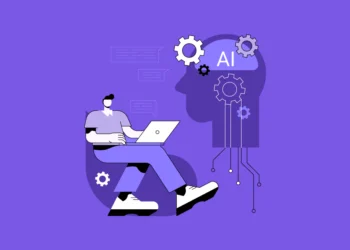Ultimately! The era of digital transformation has provoked businesses to look for different ways to innovate, streamline operations, and attain a competitive edge. Here, Artificial Intelligence has surely been raised as a transformative technology with several revolutionizing capabilities to transform how business operates. Now, to unlock the true potential of AI, businesses must require to go beyond just adopting AI tools or platforms. They need to understand the following aspects:
- What is AI integration?
- How can it seamlessly connect AI with existing systems or processes?
AI integration clearly highlights the process of incorporating AI technologies into the existing system applications or workflows to attain the following benefits:
- Drive or make data-driven decisions
- Automate business operations
Today, companies are continuously looking for ways to leverage AI’s potential for adding betterment to everything, from customer experiences to operational efficiency. Here, the process of integrating AI plays a crucial role that makes it a critical business strategy to adopt in 2025.
So, in this article, we’ll explore the concept of AI integration, its significance in modern business practices, and why businesses must invest in AI integration solutions.
What is AI Integration?
AI integration is regarded as the process of embedding Artificial intelligence technologies within the existing business systems and process to attain following benefits:
- Enhances decision-making
- Improved overall business efficiency
This process further includes combining AI tools with the existing software, platforms, and infrastructure to attain data-driven insights with process automation and intelligent actions.
AI Integration typically emphasizes creating seamless communication between AI-powered systems along with traditional business applications. The primary objective is to enable businesses to add AI’s capabilities without requiring a complete overhaul of the existing systems.
This clearly involves implementation of AI to CRM (customer relationship management) tools, ERP (Enterprise Resource Planning) systems, or data analytics platforms.
Ideally, AI integration is not about creating new AI systems from scratch, but it is making AI work harmoniously with business operations. This further empowers companies to attain new heights of productivity and insights.
How Does AI Integration Work?

Now, we have an idea “What is AI integration?”. Now, let’s observe its working in detail.
The process of integrating AI to business systems can significantly vary based on goals and technology being utilized. However, most AI integration projects typically follow a structured sequence or approach to ensure successful implementation and adoption. Let’s walk through this working approach:
1. Identifying Business Needs or Objectives:
Before jumping over technical aspects, businesses must identify their primary goals, i.e., why they are willing to implement AI. Some of the common objectives are as follows:
- Enhanced Customer Service
- Attain Better Insights of data
- Betterment of Operational Efficiency
Hence, identifying a clear business objective is surely the first step to ensure AI integration aligns with company goals.
2. Opting for Appropriate AI Solutions:
After having a clear idea of the objective, move ahead with choosing a wide range of AI integration solutions available in the market. Some of commonly used AI integration solutions are, as follows:
- Machine Learning Models
- Natural Language Processing tools
- Predictive Analytics Algorithms
Moreover, the key is choosing the right AI technology that suitably aligns with specific use cases or seamlessly integrates with existing systems.
3. Data Preparation and Management:
AI basically relies on data, and its quality is majorly highly essential for successful integration. Hence, businesses must ensure that their data is clean, accurate, and well-structured.
In some use cases, AI in Big Data Analytics plays a critical role. Generally, companies utilize large datasets to train machine learning models and generate insights. With proper data management, businesses can ensure AI is working effectively to provide appropriate results.
4. System Integration:
By utilizing the right AI tools and data, the next step of the AI integration process is to add appropriate technology to the existing systems. Moreover, the implementation of appropriate technology may involve following procedures:
- Setting up data pipelines
- Embedding AI capabilities to CRM, ERP, or customer service systems
Additionally, businesses must ensure that the integration process is seamless with minimal disruptions.
5. Testing and Iteration:
Once integration is completed, a set of rigorous testing procedures is required to ensure AI solutions executes as per expectations. Moreover, businesses must ensure that their AI is delivering accurate insights and automating processes effectively. To ensure this, companies must follow following aspects:
This iterative process allows businesses to continuously improve the AI system for optimal results.
6. Continuous Monitoring and Optimization:
On completing the AI integration, businesses need to monitor the system to attain the best possible results or performance. For betterment of these system, businesses may initiate with following procedures:
- Ensuring system’s quick adaptation to new data or changing needs
Here, AI integration services may assist businesses with ongoing support or optimization to attain maximized value of their AI investments.
What is the Importance of AI Integration for Modern Businesses?

Now, let’s take an overview of benefits or importance of AI integration for modern businesses or across different industries in detail:
1. Better Decision Making with Data-Driven Insights:
With AI integration, businesses can enjoy more informed decision-making by utilizing real-time data or predictive analytics. Moreover, implementation of AI to business systems can help companies with automation of analysis with uncovering patterns or insights. These insights significantly assist businesses to make quick decisions, from optimized supply chain to refined marketing strategies.
2. Automation of Repetitive Tasks:
Another major benefit associated with AI integration is its ability to automate repetitive tasks. With the implementation of AI-powered automation in different departments, businesses can streamline their operation with freeing up employees to indulge with more value-driven tasks.
3. Enhanced Customer Experiences:
AI tends to improve customer experiences with personalized interactions or predictive customer preferences. Once AI has been integrated to CRM systems, this technology can analyze customer data to design marketing messages with product recommendations and personalized customer support.
4. Scalability and Flexibility:
Globally, the fact is that systems must evolve or scale with business growth. Therefore, AI integration solutions ensure businesses scale their operations efficiently with process automation. Utilizing AI capabilities, businesses can streamline their workflows with reduced bottlenecks and handle larger workloads (without increasing resources).
5. Competitive Advantage:
Businesses can significantly attain a competitive edge with effectively integrating AI to the operational aspects. Moreover, businesses can outperform competitors by adding AI to process optimization, customer insights, and automation. Generally, these competitors rely on outdated technologies or manual processes.
What does AI Integration in Big Data Analytics define?
Within 2025, the integration of AI to Big data analytics will surely reshape business scenarios. By harnessing the potential of AI, organizations can significantly process vast datasets quickly and effectively to attain hidden insights to define business strategy.
Hence, AI in big data analytics can assist businesses to process and analyze data at scale. These AI algorithms have the tendency to identify patterns, correlations, and trends within large datasets. This further offers businesses with actionable insight in real-time. As a result, businesses can make better decisions keeping data as focused, instead of intuitions.
How do AI Integration Services help?
AI integration is crucially beneficial in several aspects; however, this process can be complex yet challenging. The process of integrating AI significantly requires expertise in terms of technology with specific systems. To enjoy a seamless or modern business system, companies are willing to share partnerships with AI integration services.
An experienced AI integration company can help businesses with identifying the best AI solutions to fulfill their needs. These companies guide them with the integration process with ongoing support or optimization. These service providers tend to help businesses to eradicate common pitfalls with reduced implementation time and attain desired results.
Conclusion:
AI integration is surely transforming how businesses operate, analyze data, and engage with customers. With the implementation of AI in business systems, organizations can assist with the following benefits:
- Improved decision making
- Better customer experiences
- Attain competitive edge
The process of integrating AI can be daunting, however, with appropriate AI integration solutions or expert services, businesses can enjoy a smooth transition. With continuous embracing for digital transformation, AI integration plays a critical role in reshaping the future of business operations.
For organizations seeking to integrate AI into their operations, partnering with a professional AI integration services provider can ensure that the integration is both seamless and effective. Moreover, AI technology is surely evolving and thus, with integration, businesses can add power to their operation to drive innovation with growth.

















